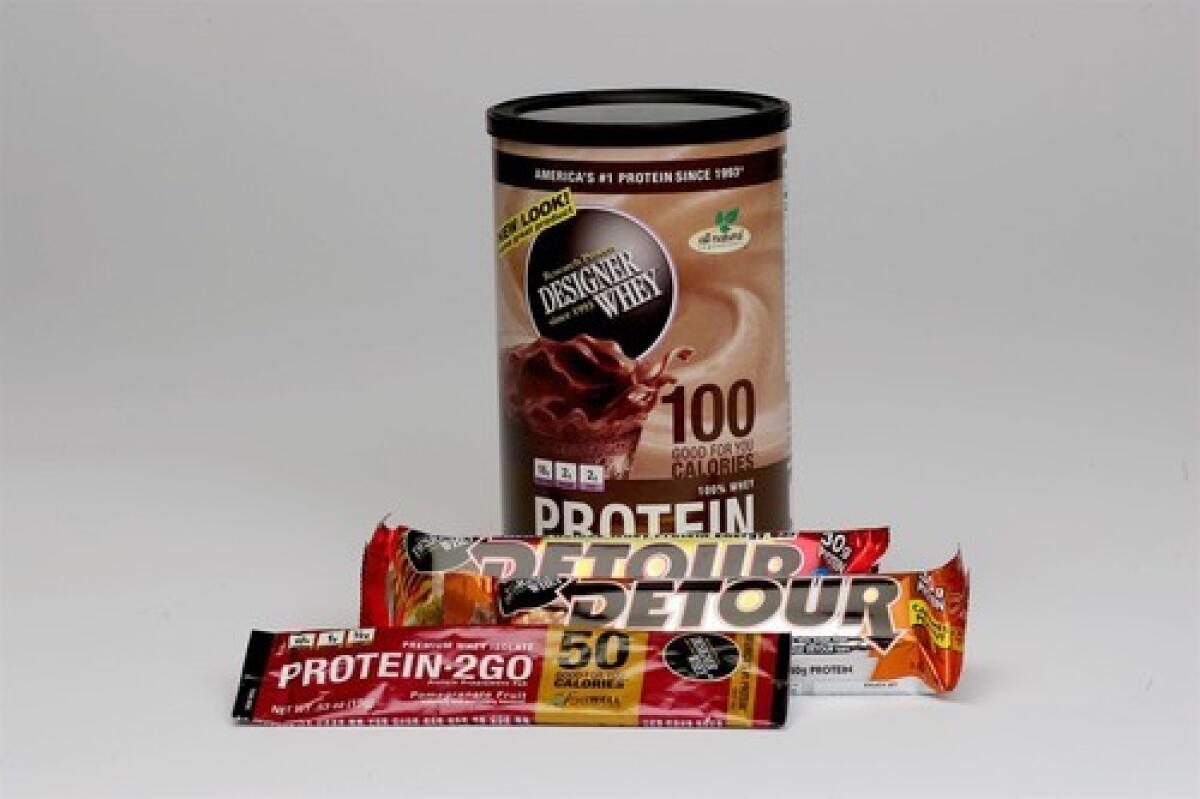Protein supplements are handy boost to athletes

The products: At weight rooms, jogging tracks and football fields across the country, the path to athletic success is often littered with protein bar wrappers and empty protein powder canisters.
Many athletes -- especially bodybuilders and others looking for extra muscle mass -- have become near-obsessive in their quest for protein, says Ben Miller, an assistant professor of health and exercise science at Colorado State University in Fort Collins who specializes in nutrition and athletic performance. A dedicated cyclist, Miller eats the occasional protein bar himself, but other exercisers make him look like a protein lightweight. “A lot of strength-training athletes eat protein every two or three hours,” he says.
Grocery stores and health food stores offer lots of high-protein powders, shakes, bars and pills for the gym set. Many of the products contain whey, an extract of curdled milk. Soy, egg and casein (another milk byproduct) are also popular ingredients.
A couple of examples: Designer Whey, a concentrated powder that comes in a variety of flavors, contains 18 grams of protein and 2 grams of carbohydrates per scoop. Users are instructed to mix a scoop of powder with water or some other liquid. The label suggests getting a full scoop’s worth of the mix before exercise, a scoop’s worth 15 to 20 minutes after exercise, and intermittent sips during exercise. A 12.7-ounce canister costs about $13, which adds up to roughly a dollar per scoop. A 2.8-ounce Nitro-Tech Hardcore protein bar containing 30 grams of protein and 32 grams of carbs costs more than $2. (That adds up to about $1 for each 15 minutes of aftertaste.) The website encourages users to enjoy a Nitro-Tech bar at any time “as part of your diet and strength training.”
The claims: The label for Designer Whey promises “better stamina,” “better power” and “better recovery.” According to the company website, Designer Whey “has produced bigger and better results than any other protein supplement in history -- up to 3 times better than regular whey proteins.” The label for Nitro-Tech Hardcore protein bars simply states that it “builds muscles fast.”
The bottom line: Anyone who’s serious about exercise needs to be serious about protein, says Richard Kreider, chairman of the department of health and kinesiology and director of the Exercise & Sport Nutrition Laboratory at Texas A&M University in College Station. Just as the ads claim, the body does need extra protein to build muscle and recover from a strenuous workout, Kreider says. “Almost everyone agrees that the RDA for protein isn’t sufficient for athletes or anyone exercising for more than one hour a day.”
The official recommended dietary allowance for protein for healthy adults is 0.8 grams per kilogram of body weight. For a person weighing 68 kilograms (150 pounds), that would mean about 54 grams of protein each day, about what you’d get from an egg, a chicken breast and a glass of milk. In a 2007 report in the Journal of the International Society of Sports Nutrition, Kreider and other researchers concluded that athletes should aim for a daily quota of 1.4 grams to 2 grams of protein per kilogram of body weight, or 175% to 250% of the RDA. The low end of the range is intended for endurance athletes, and the high end is for weight lifters and strength trainers.
Athletes can easily reach these goals without supplements, Miller says. By simple math, a runner or weight lifter who eats 4,000 calories a day is likely to get twice as much protein as a person who gets by on just 2,000 calories. No powder or pill required.
Supplements do make it easier for athletes to get their protein when it will do the most good, Kreider says. Protein works best when consumed right before, during and right after a workout, he says. Because not everyone can grab a glass of milk or a cup of yogurt (or a chicken breast) in the gym, protein supplements can be a convenient alternative.
Contrary to popular belief, a megadose of protein won’t go straight to the muscles, Miller says. “A lot of athletes end up with expensive urine.” On the other hand, the protein won’t do any damage, either: “Bars may have more protein than you really need, but that doesn’t mean that they’re harmful.”
In their 2007 report, Kreider and colleagues state that people with healthy kidneys shouldn’t have any trouble flushing away extra protein. The report concludes that active people have no reason to fear that shakes and supplements will put their health at risk.
Many products on the market today claim to have the ideal proteins for building muscle. But according to Miller, there’s not much practical difference among the high-quality proteins found in whey, casein, soy and egg.
No matter which product they chose, most people would need a lot of old-fashioned training to look anything like the hyper-muscled weight lifters featured in ads and product labels, Kreider says. “Many products are over-hyped. The science [of protein] has gotten a whole lot better, but there’s still a problem with marketing.”
Is there a consumer product you’d like the Healthy Skeptic to examine? E-mail the details to [email protected].






